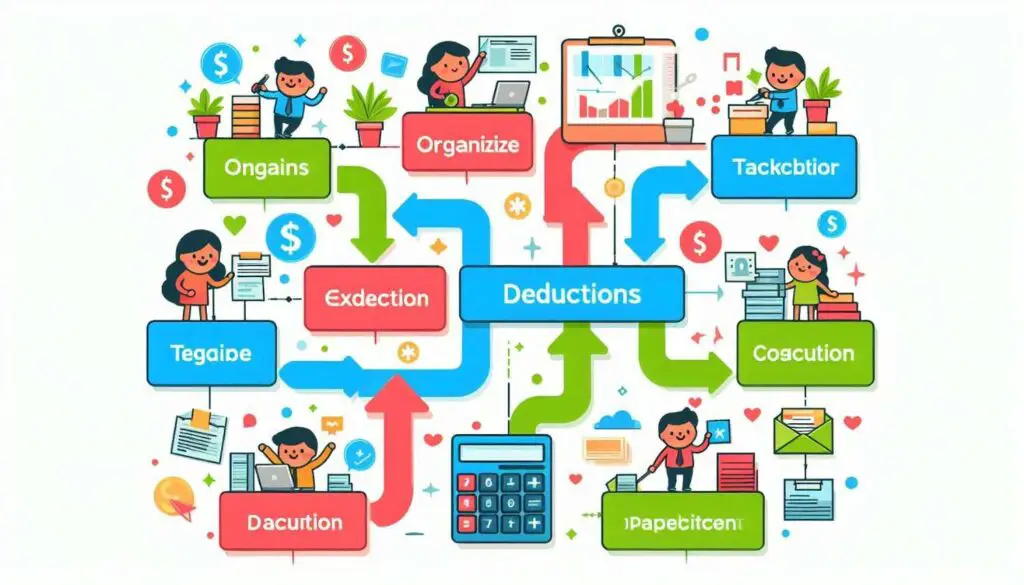Self-employed Tax Deductions for Freelance Writers. Being a freelance writer comes with many perks, like setting your own hours, choosing your projects, and working from the comfort of your home. However, it also comes with responsibilities, especially when it comes to managing your taxes.
One of the biggest advantages you have as a self-employed individual is the ability to reduce your taxable income through various deductions.
In this article, we’ll delve into everything you need to know about tax deductions for freelance writers, helping you keep more of your hard-earned money.
Self-employed Tax Deductions for Freelance Writers

Understanding Self-employment Taxes
What are Self-employment Taxes?
When you’re self-employed, you’re not just the employee; you’re also the employer.
This means you’re responsible for paying both the employee and employer portions of Social Security and Medicare taxes.
These combined taxes are known as self-employment taxes, which currently amount to 15.3% of your net earnings.
Unlike traditional employees, whose taxes are automatically withheld from their paychecks, freelancers must calculate and pay these taxes on their own.
Why Freelancers Need to Pay Self-employment Taxes
The IRS requires self-employed individuals to pay self-employment taxes if they earn $400 or more in net income.
This is because the government still needs to collect Social Security and Medicare taxes, even though you don’t have an employer handling it for you.
Understanding your tax obligations as a freelancer is crucial to avoid any unpleasant surprises when tax season rolls around.
Essential Tax Deductions for Freelance Writers
Now that we’ve covered the basics of self-employment taxes, let’s dive into the deductions that can help you lower your tax bill.
Here are some of the most common and valuable deductions for freelance writers:

Home Office Deduction
Criteria for Claiming the Home Office Deduction
The home office deduction is one of the most significant tax breaks available to freelancers.
To qualify for this deduction, your workspace must be used exclusively and regularly for your writing business.
This means your home office can’t double as a guest room or be used for non-business activities.
It should be a dedicated space where you conduct your business, whether it’s a separate room or a designated area in your home.
Calculating Your Home Office Deduction
There are two methods to calculate your home office deduction: the simplified method and the regular method.
The simplified method allows you to deduct $5 per square foot of your home used for business, up to a maximum of 300 square feet.
The regular method, on the other hand, involves calculating the percentage of your home
that is used for your office and applying that percentage to your total home expenses, such as rent, mortgage interest, utilities, and insurance.
Both methods can be beneficial, so it’s worth calculating your deduction using both to see which gives you the larger deduction.
Office Supplies and Equipment
What Qualifies as Office Supplies and Equipment?
As a freelance writer, you likely spend money on various office supplies and equipment necessary for your work.
These can include items like pens, paper, notebooks, computers, printers, and more. Essentially, any item you use in your daily business operations can qualify as an office supply or equipment.
Even larger purchases, like a new laptop or desktop computer, can be deducted, though you may need to depreciate these over time.
How to Track and Deduct Office Supplies and Equipment
To deduct office supplies and equipment, keep all receipts and records of your purchases.
You should categorize these expenses throughout the year to make it easier to total them up when filing your taxes.
At tax time, you’ll list these deductions on Schedule C under “Office Supplies.”
For larger equipment like computers, you may need to spread the deduction over several years through depreciation.
Internet and Phone Expenses
Deducting Internet Costs
Your internet connection is essential for your freelance writing business, whether you’re researching, communicating with clients, or submitting work.
The good news is that you can deduct a portion of your internet bill as a business expense.
The key is to determine what percentage of your internet use is for business purposes. For instance, if you estimate that 80% of your internet usage is for work, you can deduct 80% of your internet bill.
Deducting Phone Bills
Similarly, you can deduct a portion of your phone bills.
If you use your phone for both personal and business purposes, you’ll need to estimate the percentage of time it’s used for work and deduct that portion.
If you have a separate phone line for your business, you can deduct the entire cost.
Keeping detailed records of your phone usage will help you accurately calculate this deduction.
Also read – Best Crypto Savings Accounts for US Residents
Travel and Mileage
Deductible Travel Expenses
If your freelance work involves traveling, whether it’s to meet clients, attend conferences, or conduct research, you can deduct many of your travel-related expenses.
This includes airfare, hotel stays, transportation, and even a portion of your meals while traveling.
To qualify, the travel must be directly related to your business, and you’ll need to keep detailed records of your expenses.
Keeping Track of Mileage
If you drive to meet clients or attend business-related events, you can deduct your mileage.
The IRS provides a standard mileage rate that you can use to calculate your deduction, which may change each year.
Alternatively, you can track your actual expenses, such as gas, maintenance, and insurance, and deduct those.
Using a mileage tracking app can simplify this process, ensuring you don’t miss out on any deductions.
Educational Expenses
What Counts as Educational Expenses?
As a freelance writer, it’s important to continually improve your skills and stay updated on industry trends.
Any expense related to your education that helps you improve your writing or expand your business knowledge can be considered an educational expense.
This includes costs for courses, webinars, books, and even subscriptions to industry-related publications.
How to Claim Educational Expenses
To claim educational expenses, you’ll need to ensure that the expenses are directly related to your business.
For example, if you take a course on SEO writing to improve your services, that expense is deductible.
Keep detailed records of the courses you take or materials you purchase, as you’ll need to provide this information when filing your taxes.
Educational expenses are usually listed under “Other Expenses” on Schedule C.
Marketing and Advertising
Deductible Marketing Expenses
Marketing is crucial to growing your freelance writing business, and the costs associated with it are deductible.
This includes expenses for things like website hosting, business cards, online advertising, and social media promotions.
Whether you’re paying for Google Ads or boosting posts on social media, these costs can be deducted as a business expense.
Maximizing Your Marketing Deduction
To maximize your marketing deduction, keep track of all marketing-related expenses throughout the year.
Use accounting software to categorize these expenses and ensure nothing is overlooked.
At tax time, total these expenses and deduct them on Schedule C under “Advertising.” Staying organized throughout the year will make this process much easier.
Software and Subscriptions
Which Software and Subscriptions are Deductible?
In today’s digital age, software and subscriptions are essential tools for freelance writers.
Whether it’s word processing software, design tools, or project management apps, the costs associated with these tools are deductible.
This also includes subscriptions to industry-relevant websites or magazines that help you stay informed about your field.
Reporting Software and Subscription Costs
To report software and subscription costs, keep records of all purchases, including renewal dates and amounts.
These expenses can be deducted under “Office Expenses” on Schedule C. For more expensive software, such as a full suite of design tools, you may need to depreciate the cost over several years.
How to Organize and Track Deductions

Importance of Record-keeping
Proper record-keeping is crucial for maximizing your tax deductions and staying on the right side of the IRS.
Without accurate records, you could miss out on valuable deductions or face issues during an audit.
The best practice is to maintain a separate business account for all your income and expenses, making it easier to track everything.
Additionally, keeping all receipts and invoices organized throughout the year will save you time and stress when it’s time to file your taxes.
Tools and Software for Tracking Expenses
Numerous tools and apps can help you track your expenses and stay organized.
Popular options include QuickBooks, FreshBooks, and even simple spreadsheets. Choose a system that works best for you and stick with it throughout the year.
This will ensure that you capture all potential deductions and can easily access the information you need when filing your taxes.
Common Mistakes to Avoid When Claiming Deductions
Overestimating Deductions
One of the most common mistakes freelancers make is overestimating their deductions.
While it’s important to take advantage of all available deductions, it’s equally important not to exaggerate them.
The IRS is always on the lookout for inflated deductions, and overestimating could lead to an audit or penalties. Make sure your deductions are reasonable and well-documented.
Not Keeping Proper Records
Another common mistake is failing to keep proper records.
Without receipts or detailed records of your expenses, it’s challenging to claim deductions.
Even if you have a legitimate deduction, the IRS may disallow it if you can’t provide the necessary documentation.
Keeping organized records is essential to ensure you can claim all your deductions without issues.
Misclassifying Expenses
Misclassifying expenses is another mistake that can cause problems at tax time.
For example, some freelancers mistakenly deduct personal expenses as business expenses, which is not allowed.
It’s important to understand the difference between personal and business expenses and to categorize them correctly on your tax return.
If you’re unsure, consult a tax professional to help you accurately classify your expenses.
Conclusion
Navigating self-employment taxes as a freelance writer can be challenging, but understanding the deductions available to you can make a significant difference in your tax bill.
By taking the time to track your expenses, maintain proper records, and stay informed about the deductions you’re eligible for, you can minimize your tax liability and keep more of your hard-earned money.
Remember, when in doubt, consult with a tax professional to ensure you’re making the most of your deductions while staying compliant with IRS regulations.
FAQs
1. Can I deduct my health insurance premiums?
Yes, as a self-employed individual, you can deduct health insurance premiums for yourself, your spouse, and your dependents. This deduction is available even if you don’t itemize your deductions.
2. Are software subscriptions fully deductible?
Yes, if the software is necessary for your business operations, the cost is fully deductible. Just make sure to keep all receipts and proof of purchase.
3. How do I deduct a home office if it’s not a separate room?
Even if your home office isn’t a separate room, you can still deduct it as long as it’s a distinct, exclusive area used regularly for business. Measure the area and apply the deduction accordingly.
4. Can I deduct meals with clients?
Yes, you can deduct 50% of meal costs if they are directly related to your business. Be sure to document the purpose of the meal and who attended.
5. What happens if I’m audited?
If you’re audited, the IRS will ask for documentation of your deductions. This is why keeping detailed records and receipts is crucial. If your deductions are legitimate and well-documented, you should be able to defend them without issue.


1 thought on “Self-employed Tax Deductions for Freelance Writers”